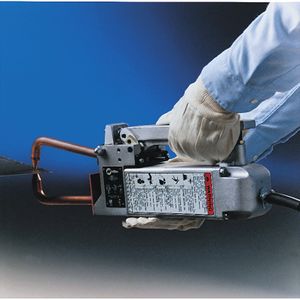Difference between revisions of "Spot Welder"
| (48 intermediate revisions by 10 users not shown) | |||
| Line 4: | Line 4: | ||
|Is located in facility=Welding Shop | |Is located in facility=Welding Shop | ||
|Is used in domain= | |Is used in domain= | ||
| − | |Has icon=File: | + | |Has name={{PAGENAME}} |
| + | |Has make=Miller | ||
| + | |Has model=LMSW-52 | ||
| + | |Has serial number=MJ328801N | ||
| + | |Has life expectancy= | ||
| + | |Has year of manufacture or purchase= | ||
| + | |Has replacement cost= | ||
| + | |Has icon=File: Spot_welderIcon.png | ||
|Has icondesc=Reflow Oven Icon | |Has icondesc=Reflow Oven Icon | ||
|Has image=File:protoflow.jpg | |Has image=File:protoflow.jpg | ||
|Has imagedesc=Protoflow Reflow Oven | |Has imagedesc=Protoflow Reflow Oven | ||
| − | |Has description= | + | |Has description= |
| − | |Has certification= | + | |Has certification=https://georgefox.instructure.com/courses/1281 |
| − | |||
| − | |||
|Has group=Circuit Board Design | |Has group=Circuit Board Design | ||
| + | |Has ace=Needed;Makerhub@georgefox.edu | ||
}} | }} | ||
| − | [[{{#show: {{FULLPAGENAME}}|?Has icon|link=none}}| | + | [[{{#show: {{FULLPAGENAME}}|?Has icon|link=none}}|140px|left|top|{{#show: {{FULLPAGENAME}}|?Has icondesc}}]] |
| − | + | ||
| + | Make: {{#show: {{PAGENAME}} |?Has make}} | ||
| + | |||
| + | Model: {{#show: {{PAGENAME}} |?Has model}} | ||
| + | |||
| + | Serial Number: {{#show: {{PAGENAME}} |?Has serial number}} | ||
| + | |||
| + | Ace: {{#show: {{PAGENAME}} |?Has ace.Has name}} ({{#show: {{PAGENAME}} |?Has ace.Has email address}}). | ||
| + | |||
| + | Location: {{#show: {{PAGENAME}} |?Is located in facility}} | ||
| + | |||
| + | |||
__TOC__ | __TOC__ | ||
| − | == | + | ==Safety First== |
| + | [[File:Safety First HD2.png|left|150px]] | ||
| + | * Wear gloves and welding helmet. | ||
| + | * Don't have bare skin exposed. | ||
| + | * Don't weld in wet gear or standing water. | ||
| + | * Welded material will be hot. | ||
| + | |||
| + | |||
| + | |||
| + | ==Description== | ||
| + | Resistance spot welding is a process in which contacting metal surface points are joined by the heat obtained from resistance to electric current. The Miller LMSW-52 Air-Cooled Spot Welder is a lightweight unit that is portable, easy to operate and excellent for welding mild, galvanized or stainless sheet materials.<br /> | ||
* LMSW-52 spot welder manual [https://www.millerwelds.com/-/media/e50208051cc3492c9016790b303abf4f.pdf] | * LMSW-52 spot welder manual [https://www.millerwelds.com/-/media/e50208051cc3492c9016790b303abf4f.pdf] | ||
| − | == | + | |
| − | # | + | Here is an example of spot welding and some good basic information. |
| + | {{#evu:https://www.youtube.com/watch?v=6pVsZrDf-R8}} | ||
| + | |||
| + | ==Documentation== | ||
| + | |||
| + | [[Media:Spot_Welder_Manual.pdf|Spot Welder User Manual]] | ||
| + | |||
| + | ====Terminology==== | ||
| + | |||
| + | *Electrode Tips – The copper ends of the tongs that make contact with the workpiece to deliver welding current. | ||
| + | *Arms / Handles – The insulated portions you hold; provide leverage to open/close the tongs. | ||
| + | *Jaws – The part of the tongs where the electrode tips are mounted; may pivot to adjust pressure. | ||
| + | *Adjustment Knob / Screw – Used to set electrode pressure for consistent welds. | ||
| + | *Cable / Conductor – Heavy cable connecting the tongs to the welder to carry welding current. | ||
| + | *Spring Mechanism – Internal spring that helps return the tongs to the open position when released. | ||
| + | *Insulation / Grip – Protective covering to prevent electric shock and allow safe handling. | ||
| + | |||
| + | ==Training== | ||
| + | |||
| + | ====Operation==== | ||
| + | Here are some general setup rules of thumb: | ||
| + | *The maximum weld capacity is 2 sheets of 16 gauge material. | ||
| + | |||
| + | ====Demonstration==== | ||
| + | |||
| + | For the demonstration you will need to perform a spot weld using two pieces of scrap material. | ||
| + | |||
| + | ====General Procedure==== | ||
| + | # Ensure the material being welded should be clear of any oil or dust | ||
# Turn on the spot welder | # Turn on the spot welder | ||
# Place the material being welded between the clamps. | # Place the material being welded between the clamps. | ||
| − | # Clamp down on the two pieces of material for | + | # Clamp down on the two pieces of material for approximately 2 seconds. The time required to weld may vary slightly depending on the material and thickness. |
# Grab workpiece with a set of pliers, and open the clamp. | # Grab workpiece with a set of pliers, and open the clamp. | ||
| − | |||
<references /> | <references /> | ||
| + | |||
| + | ==Certification== | ||
| + | Complete the <strong>Welding Shop - {{PAGENAME}} Module</strong> at the link below to gain access to the {{PAGENAME}}. The Maker Hub Canvas course pertains to all facilities and equipment contained in the Maker Hub; simply complete the quizzes for the facilities/equipment you wish to use in the Maker Hub. Please email <span style="color:blue">makerhub@georgefox.edu</span> if you have any questions. | ||
| + | |||
| + | [https://georgefox.instructure.com/enroll/R6RF69 Maker Hub Canvas Course] | ||
| + | |||
| + | ==Troubleshooting== | ||
| + | |||
| + | *No weld or weak weld: | ||
| + | **Check electrode tips for wear, dirt, or oxidation; clean or replace as needed. | ||
| + | **Verify proper electrode pressure; adjust using the adjustment knob/screw. | ||
| + | **Ensure cables are securely connected and not damaged. | ||
| + | *Sparks at handles / arcing: | ||
| + | **Inspect insulation on handles and tongs; replace if cracked or damaged. | ||
| + | **Confirm all connections are tight and corrosion-free. | ||
| + | *Tongs won’t open/close smoothly: | ||
| + | **Check spring mechanism for damage or debris; clean and lubricate lightly if needed. | ||
| + | **Ensure pivot points are not seized or misaligned. | ||
| + | *Overheating tongs: | ||
| + | **Reduce duty cycle; allow tongs to cool between welds. | ||
| + | **Check for proper current settings and electrode contact. | ||
| + | *Uneven welds: | ||
| + | **Inspect electrode tips for uneven wear; dress or replace as needed. | ||
| + | **Confirm correct alignment of jaws and consistent pressure. | ||
| + | |||
| + | ==Maintenance== | ||
| + | ====General maintenance==== | ||
| + | |||
| + | The welding tips should be inspected and cleaned as needed. | ||
| + | |||
| + | ====Specific Maintenance Tasks==== | ||
| + | {| class="wikitable" | ||
| + | !Maintenance Procedure | ||
| + | !Frequency | ||
| + | !Done By | ||
| + | |- | ||
| + | |N/A | ||
| + | |N/A | ||
| + | |N/A | ||
Latest revision as of 11:48, 15 August 2025
Make: Miller
Model: LMSW-52
Serial Number: MJ328801N
Ace: Needed (Makerhub@georgefox.edu).
Location: Welding Shop
Safety First
- Wear gloves and welding helmet.
- Don't have bare skin exposed.
- Don't weld in wet gear or standing water.
- Welded material will be hot.
Description
Resistance spot welding is a process in which contacting metal surface points are joined by the heat obtained from resistance to electric current. The Miller LMSW-52 Air-Cooled Spot Welder is a lightweight unit that is portable, easy to operate and excellent for welding mild, galvanized or stainless sheet materials.
- LMSW-52 spot welder manual [1]
Here is an example of spot welding and some good basic information.
Documentation
Terminology
- Electrode Tips – The copper ends of the tongs that make contact with the workpiece to deliver welding current.
- Arms / Handles – The insulated portions you hold; provide leverage to open/close the tongs.
- Jaws – The part of the tongs where the electrode tips are mounted; may pivot to adjust pressure.
- Adjustment Knob / Screw – Used to set electrode pressure for consistent welds.
- Cable / Conductor – Heavy cable connecting the tongs to the welder to carry welding current.
- Spring Mechanism – Internal spring that helps return the tongs to the open position when released.
- Insulation / Grip – Protective covering to prevent electric shock and allow safe handling.
Training
Operation
Here are some general setup rules of thumb:
- The maximum weld capacity is 2 sheets of 16 gauge material.
Demonstration
For the demonstration you will need to perform a spot weld using two pieces of scrap material.
General Procedure
- Ensure the material being welded should be clear of any oil or dust
- Turn on the spot welder
- Place the material being welded between the clamps.
- Clamp down on the two pieces of material for approximately 2 seconds. The time required to weld may vary slightly depending on the material and thickness.
- Grab workpiece with a set of pliers, and open the clamp.
Certification
Complete the Welding Shop - Spot Welder Module at the link below to gain access to the Spot Welder. The Maker Hub Canvas course pertains to all facilities and equipment contained in the Maker Hub; simply complete the quizzes for the facilities/equipment you wish to use in the Maker Hub. Please email makerhub@georgefox.edu if you have any questions.
Troubleshooting
- No weld or weak weld:
- Check electrode tips for wear, dirt, or oxidation; clean or replace as needed.
- Verify proper electrode pressure; adjust using the adjustment knob/screw.
- Ensure cables are securely connected and not damaged.
- Sparks at handles / arcing:
- Inspect insulation on handles and tongs; replace if cracked or damaged.
- Confirm all connections are tight and corrosion-free.
- Tongs won’t open/close smoothly:
- Check spring mechanism for damage or debris; clean and lubricate lightly if needed.
- Ensure pivot points are not seized or misaligned.
- Overheating tongs:
- Reduce duty cycle; allow tongs to cool between welds.
- Check for proper current settings and electrode contact.
- Uneven welds:
- Inspect electrode tips for uneven wear; dress or replace as needed.
- Confirm correct alignment of jaws and consistent pressure.
Maintenance
General maintenance
The welding tips should be inspected and cleaned as needed.
Specific Maintenance Tasks
| Maintenance Procedure | Frequency | Done By |
|---|---|---|
| N/A | N/A | N/A |

